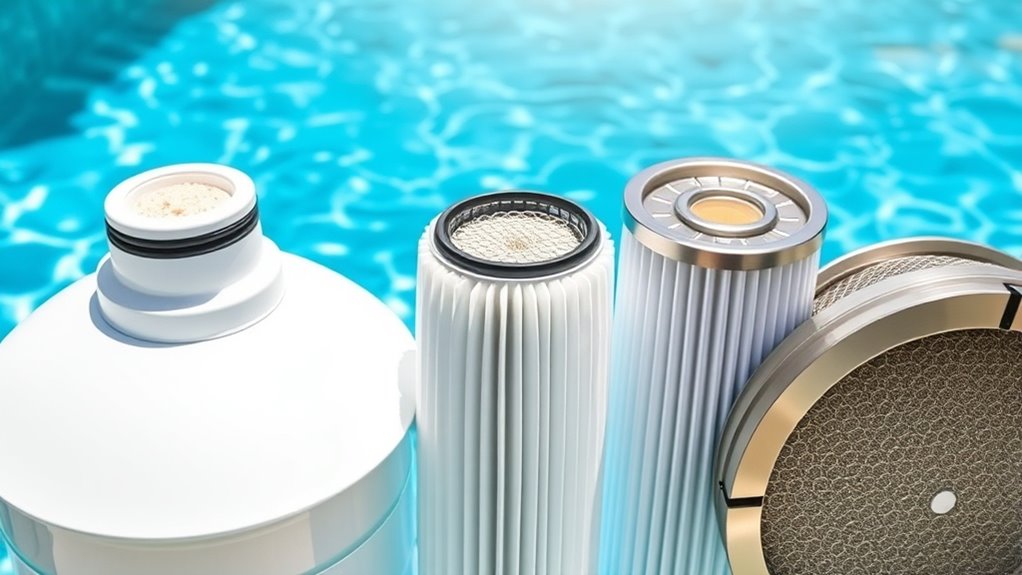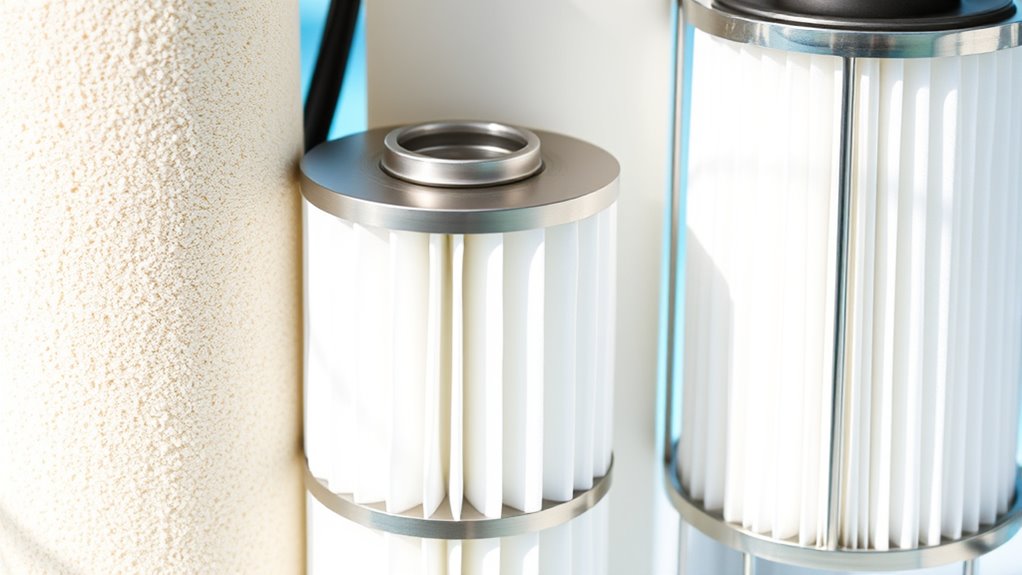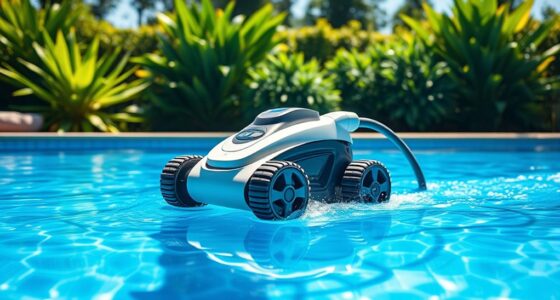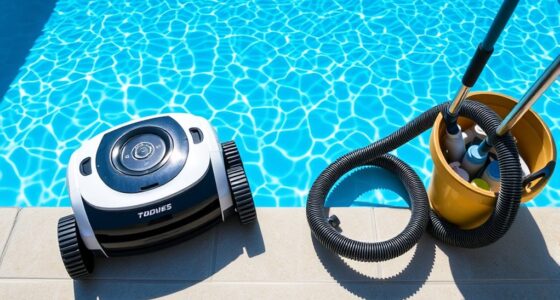To keep your pool water clear and safe, regularly maintain your sand, cartridge, and DE filters by performing backwash or cleaning when flow slows or clarity drops. For sand filters, backwash to remove debris; for cartridge filters, inspect and hose off or replace cartridges; and for DE filters, perform backwashing and dose new DE powder as instructed. Proper filter care helps prevent contaminants and supports water chemistry — stay with us to discover more tips.
Key Takeaways
- Regularly backwash sand and DE filters to remove accumulated debris and maintain efficiency.
- Clean cartridge filters every few weeks with a hose or filter cleaner to ensure proper water flow.
- Add fresh DE powder periodically to DE filters following manufacturer instructions for optimal filtration.
- Inspect all filters for damage or wear and replace cartridges or DE grids as needed.
- Proper filter maintenance supports water clarity, reduces contaminants, and promotes balanced water chemistry.

Ever wondered how to keep your pool water crystal clear and inviting? The key lies in proper filter care combined with good water chemistry. Your pool filter plays a essential role in removing debris, dirt, and unwanted particles, ensuring that your water stays sparkling and safe. But simply turning on the filter isn’t enough; regular maintenance is indispensable to keep it functioning efficiently and to maintain ideal water quality.
Proper filter care and balanced water chemistry keep your pool sparkling and safe.
First, understand the different types of filters—sand, cartridge, and DE (diatomaceous earth)—and how each requires specific care. Sand filters are generally low-maintenance, but they still need regular backwashing to clear out accumulated dirt. When you notice a decrease in water flow or clarity, it’s time to backwash your sand filter. This process involves reversing the flow of water to flush out debris lodged in the sand bed. Doing this periodically keeps your filter working effectively, which in turn supports the overall water chemistry by preventing contaminants from circulating.
Cartridge filters collect debris on a replaceable or cleanable element. You should inspect the cartridges every few weeks, especially after heavy use or storms, and clean them with a garden hose or a filter cleaner to remove dirt and oils. A clean cartridge promotes better water flow and filtration, reducing strain on your pool pump and improving water chemistry. When cartridges become worn or damaged, replacing them ensures your filter continues to do its job.
Diatomaceous earth filters are more delicate but highly efficient. They require regular backwashing, similar to sand filters, but also need periodic addition of fresh DE powder to maintain their filter media’s effectiveness. Be cautious during DE addition to avoid spills, and always follow manufacturer instructions. Proper filter maintenance for DE systems helps prevent clogging and maintains excellent water clarity, supporting your water chemistry by minimizing the presence of organic matter and particles.
Beyond just maintaining your filter, paying attention to your water chemistry is essential. Chemicals like chlorine, pH, alkalinity, and stabilizers must be balanced properly to keep algae and bacteria at bay. Clean filters work hand-in-hand with balanced water chemistry, as dirty or clogged filters can’t effectively remove contaminants, leading to cloudy or unsafe water.
Frequently Asked Questions
How Often Should I Replace My Pool Filter Media?
You should replace your pool filter media based on its type and condition. For filter replacement, check your owner’s manual for specific guidance, but generally, media longevity is around 5 to 7 years for sand, 1 to 3 years for cartridge, and 1 year for DE filters. Regularly inspect your filter to determine if it’s clogged or worn out, and replace media promptly to maintain peak filtration and water clarity.
Can I Use Household Cleaners to Clean My Filter?
You shouldn’t use household cleaners on your pool filter because they can cause filter damage. These cleaners often contain chemicals that aren’t designed for pool filters and may degrade the filter media or internal components. Instead, choose cleaning methods recommended by the manufacturer, like using a filter cleaner specifically made for your type of filter. This guarantees your filter stays in good condition and functions properly.
What Are Signs of a Failing Pool Filter?
You’ll notice your pool filter is failing if your water becomes cloudy, algae blooms, or your filter pressure steadily rises. These signs mean your filter’s lifespan is shortening, and maintenance tips like regular cleaning and backwashing can help extend it. Don’t ignore these signs, as a failing filter reduces water quality and increases energy costs. Keep a close eye on pressure gauges and perform routine maintenance to keep your filter running smoothly.
Is It Necessary to Backwash DE Filters Regularly?
Proper pool filter maintenance mandates meticulous monitoring of backwash frequency, especially for DE filters. You should backwash your DE filter regularly to prevent buildup, ensuring ideal operation and clear water. Ignoring this essential step can cause clogs and decreased efficiency. So, yes, backing up your DE filter periodically is necessary, keeping your pool pristine and the filtration process flawless. Consistent care curtails costly complications and keeps your water crystal clear.
How Do I Choose the Right Filter Size for My Pool?
When choosing the right filter size for your pool, consider filter sizing and pool compatibility. You want a filter that can handle your pool’s water volume efficiently. Measure your pool’s size and flow rate, then select a filter rated for those specifications. A properly sized filter ensures peak filtration, keeps your water clean, and reduces maintenance. Always match the filter to your pool’s capacity for the best results.
Conclusion
By keeping your pool filter clean and well-maintained, you’re the captain steering your pool’s crystal-clear waters. Regular care acts like a shield, blocking dirt and debris from clouding your swim. Think of your filter as the heart of your pool’s health—when it beats strong and steady, your entire oasis stays vibrant and inviting. So, stay vigilant with your filter care, and enjoy a sparkling, invigorating retreat that’s always ready for your next swim.










